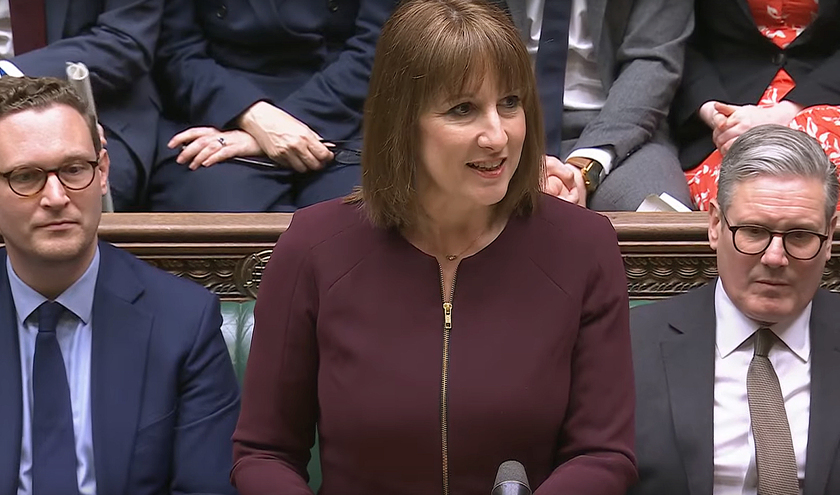Who would be chancellor in Britain today? A difficult job at the best of times, ours are a very long way from that. As the chancellor acknowledged at the outset of her speech this week, her job is to steer the British economy through a period of deep uncertainty and growing turbulence. Before coming to the challenges and opportunities presented by this global reality though, let's reflect on what the chancellor told us about the health of our economy and the Government's plans for nurturing its recovery.
The short answer is that the speech told us little we didn't already know. There was confirmation of poor short term spending data and slightly better news on long term growth projections from the OBR. The chancellor made clear on appointment that the Autumn Statement would be the time for major statements. The Spring Statement isn't, these days, even supposed to be a ‘Fiscal Event'. I am not sure what was briefed to the Press, but they, like me arrived at yesterday's speech with an expectation of more than was delivered.
There was little in the Spring Statement to suggest that the chancellor believes her fiscal stance and tax strategy to be wrong or that there is the need for fundamental change to strengthen growth. It was a ‘steady as you go' sort of a speech
I took a benign view of the chancellor's [last speech]: you could discern in it an emergent growth plan. It was a rhetorical corrective to an Autumn Budget which seemed less well judged at the time and seems little better today. The chancellor's Spring Statement could have gone further: it was the opportunity if not for a fiscal reset, then to change the fiscal mood music. It was an opportunity not taken.
The chancellor must be suffering the anxiety borne of conflict: between the requirement for fiscal rectitude and pressing investment need all around her. Where to invest as between a long-term constrained South of England with stuttering growth and a partly resurgent but still largely left-behind North and above all between the carrot of investment and reform for public services and the stick of sanction on their beneficiaries. These well-worn conundrums are the anxiety inducing fare on offer to all chancellors, Reeves more than most. But what to do about them?
There was little in the Spring Statement to suggest that the chancellor believes her fiscal stance and tax strategy to be wrong or that there is the need for fundamental change to strengthen growth. It was a ‘steady as you go' sort of a speech. Whether the chancellor thinks that or just believes that she has no choice, what we heard felt like a missed opportunity. There were important and useful announcements, principal among which was £2bn for housing next year. But not much that shifted the fiscal envelope.
The Spring Statement was spatially blind too. There was no news of note for those of us working on place-based policy. There was, in other words, little to suggest that the Government is gearing up for a new and hitherto unannounced growth policy meaning that the very narrow fiscal path the chancellor set in the Budget is worryingly dependent on some highly optimistic productivity assumptions which the OBR will revisit in the Autumn. And this, in the end, is why the Treasury is bearing down on the size of Whitehall and on benefit spending. There may be merit in both, but it looks awfully like a chancellor with a hammer who sees the solution to every problem involving a nail.
All of which brings us back to the constraints within which the Spring Statement was framed: the crisis of global stability and the withdrawal of the USA as a guarantor of the world economy and European stability. If ever a chancellor of recent decades had the opportunity to reopen her fiscal rules – or to signal as much - it was this week. It is odd that she didn't take the opportunity of presenting an emboldened growth agenda, including an invitation to anxious global capital (along with soon-to-be-redundant and globally mobile US scientists, victims of the Trump purges) to come to Britain. We need investment and smart people. There was nothing yesterday to suggest we are going to do more to bring them to work on British investment opportunities.
Turning the Ship of State takes time. It is a pity that it isn't turning more quickly. The Spending Review can't come soon enough. It is to be hoped that the course correction we need will hastened by what awaits us in June.
Mike Emmerich is founding director of Metro Dynamics
Bernstein biography: Did you know former chief executive of Manchester City Council, Sir Howard Bernstein?
Mike Emmerich, is writing a biography of the former chief executive and is iterested in hearing from colleagues keen to help – especially from the early part of Bernstein's career.
You can contact him at mike.emmerich@metrodynamics.co.uk


